
 Flash News
Flash News
Thousands of cannabis roots found and destroyed in Shkodra, 4 prosecuted
Election effect, employment in the state reaches record in the first quarter
NAME/ The assets of the businessman in Gjirokastra are seized! How Berisha denounced him in 2019
Hostage taking in Tirana, 40-year-old man forcibly taken into car
Car catches fire in Tirana

Blendi Kajisu*
There is a broad consensus that the delay in Albania's accession process to the EU poses a threat to the stability of the country and the region. There are two arguments on which this consensus is based. First, the delay and incoherence in the accession process has delegitimized the EU by weakening its role as a reform promoter and guarantor of democracy in our country. Second, the lack of a clear European perspective may bring Albania closer to other non-democratic actors in the region, such as Erdogan's Turkey.
Faced with the threat that the procrastination of the integration process represents for Albanian democracy, the solution offered is almost unanimous: the fastest possible membership of Albania in the EU. The problem is that at the stage where our democracy is, EU membership is still more dangerous than the stagnation of the integration process. So the cure, EU membership, is more dangerous than the disease itself, the procrastination of the membership process.
If Albania becomes a member of the EU with full rights, the latter's role as a promoter and guarantor of Albanian democracy will fade much more than it does today. Despite the delays of the integration process, the EU remains a powerful actor in our political scene. The reform in justice and the influence of the EU on it is clear evidence that it continues to guarantee and promote democracy in the country.
But when Albania becomes a member of the EU, the instrument of democratization through conditionality fades considerably, if not to say it disappears. It is no coincidence that many of the countries in the region such as Romania and Bulgaria, but also Central European countries such as Hungary or Poland, have marked a regression in the levels of democracy after joining the EU. As long as democratization is not an end in itself, but an instrument to enter the EU, it is not surprising that the achievement of this objective marks the end of the democratization process.
Examples like that of Hungary clearly show that membership in the EU does not necessarily mean the consolidation of democracy and even less the consolidation of a country's western orientation. Hungary today is not only less democratic than yesterday, when it was outside the EU, but it is also closer to non-democratic and anti-Western actors such as Putin's Russia, Erdogan's Turkey and Xi Ping's China. It is an orientation that often conflicts with the EU's foreign policy.
Therefore, Albania's membership in the EU will not necessarily avoid its rapprochement with problematic actors such as Erdogan's Turkey. On the contrary, it means more sovereignty and less conditioning of Albania in its foreign policy. And if we take into account the cultural, political, economic and geostrategic affinities between the two countries, it is no wonder that the relationship with Turkey will grow even if the latter turns into a dictatorship.
However, neither Turkey, nor China, and even less Russia, will be able to replace the EU, even if Albania remains indefinitely in the antechamber of European membership. First, because Albania is deeply economically integrated with the EU, which is the main economic partner of our country, not to mention the massive Albanian emigration that flows mainly to EU countries. In other words, for economic, geostrategic or cultural reasons, neither Turkey, nor China, and even less Russia, can replace Europe in the case of Albania.
Second, neither Russia nor China can replace Europe as a source of legitimation for our political class. Albanian society in its majority sees, and wants to see, itself as European and there is no dilemma between East and West, as is the case with Serbia.
This means that the risk of Albania losing its western orientation or falling prey to eastern influences, as a result of the delay in the integration process, is greatly exaggerated. It is a threat that is regularly used and inflated by the government to open the doors of the EU. But the truth is that Albania has nowhere to go. Maxim will create new partnerships such as the Open Balkans with Serbia, but despite criticism of this initiative, no one thinks that it is a real alternative to the EU.
For all these reasons, the danger that comes to Albanian democracy from the procrastination of the integration process has obscured an even bigger problem, that of EU membership. This does not mean that the integration drag is not a real problem for our democratization. In the end, it remains a process that is based on conditionality and the release of sovereignty in exchange for rapprochement with the EU. It is likely that an Albanian government that accepts EU conditions and gives up sovereignty in basic reforms such as justice, but is not rewarded with integration sooner or later, will resist the democratic conditioning that comes from the EU.
The problem is that for the same reason EU membership is even more problematic for a country like ours that democratizes from the outside and not from the inside. EU membership marks the end of the integration process and, consequently, the end of the conditional democratization that comes from the EU. And this is a major problem for a country like ours where the advances of democratization from abroad are faced with the regression of internal democratization.
The institutions that have marked the most progress in our democracy are the electoral process and the justice system. Both under the direct intervention and pressure of the EU and the international factor in general. Of course they are far from perfect. But it is enough to compare the parliamentary elections of 2021 with all the electoral processes of the 90s to understand how much the electoral processes in Albania have improved. Likewise, our justice system today, despite many problems, is much more independent, professional and consolidated than the justice system of the 90s.
The opposite has happened with our internal political institutions, outside of international pressure. Just look at the political parties, parliament and media where international intervention has been minimal or non-existent. The parliament of 2022 is much less democratic than that of the 90s. Likewise, the DP and DP of 2022 are much less democratic than the DP and SP of the 1990s. The same applies to the media.
Of course, neither the parties, nor the parliament, nor the media of the 90s were perfect. There was intolerance, authoritarianism, lack of professionalism and even violence that bloodied the Parliament of Albania and Skënderbej Square. But if in the 1990s there was a real debate both in the party, in the parliament and in the media, today these institutions have atrophied. The parliament has become the seal of the executive, the party an appendage of the president and the media an appendage of politics and economic interests. The Parliamentary Republic that we had yesterday, although with problems, today has been reduced to a Prime Ministerial Republic that has emptied democracy of any real content.
Therefore, the question we should ask today is not when Albania will join the European Union, but what will happen to the atrophied Albanian democracy after this membership, which will put an end to democratic conditioning from the outside. If in countries like Bulgaria, Romania, Poland and Hungary the membership has produced regression, what will happen to Albania? What should we do so that the European dream does not turn into a dictatorial nightmare? Of course, we know the answer to this question, we need democratization from within. The problem is that after more than three decades of democratization from the outside, we have lost the ability to democratize from the inside. That's why we continue to talk about European integration and the EU, even though the latter only talks to itself.
*This article is part of the series of articles about European integration" of the Albanian
Media Institute, within the framework of the Transition Promotion Program of the Czech Republic.
Latest news


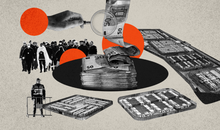
Costly experiment: Italy weighs costs of migrant centers in Albania
2025-06-26 08:54:01
Election effect, employment in the state reaches record in the first quarter
2025-06-26 08:40:21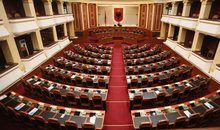
Parliament in plenary session, draft laws expected to be approved
2025-06-26 08:29:34
Horoscope, what do the stars have in store for you today?
2025-06-26 08:12:59
Parashikimi i motit, temperaturat arrijnë deri në 37 gradë
2025-06-26 07:58:10
Posta e mëngjesit/ Me 2 rreshta: Çfarë pati rëndësi dje në Shqipëri
2025-06-26 07:45:04
CIA chief: Iran's nuclear facilities 'severely damaged' by recent attacks.
2025-06-25 22:53:09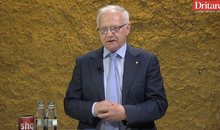
NATO spending to increase by 5%, diplomat: Aims to pull economies out of crisis
2025-06-25 22:32:28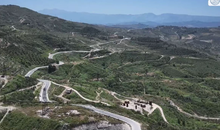

Djegia nga dielli, ja disa mënyra si ta trajotni në kushte shtëpie
2025-06-25 21:56:19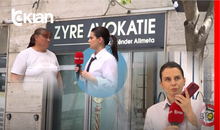

Rama: NATO Summit in 2027 will be held in Tirana
2025-06-25 21:36:35
What is known about the weapons that Serbia has banned from exporting to Israel?
2025-06-25 21:23:19


The new war front? Not in the Middle East, but in SPAK!
2025-06-25 20:40:02

Gjendet e vdekur 56-vjeçarja shqiptare në Greqi! Nënë e 3 fëmijëve
2025-06-25 20:21:03
PHOTO/ Car falls off bridge on Peqin-Elbasan axis
2025-06-25 20:11:16

Trump at NATO summit: In recent weeks we have dealt with Kosovo and Serbia
2025-06-25 19:47:10





Trump: US to meet with Iran next week, but nuclear deal not necessary
2025-06-25 18:15:22




NATO's defense plan, what will change for Albania?
2025-06-25 16:42:07
Bayern loans Albanian talent to German team
2025-06-25 16:32:00

Kremlin: US and Iran disagree on damage caused by attacks
2025-06-25 16:13:55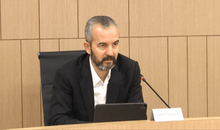
11 maji/ KQZ vulos rezultatin, u jep mandatin deputetëve për 4 qarqe të vendit
2025-06-25 16:00:32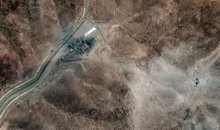
Iran: Nuclear facilities suffered severe damage from US airstrike
2025-06-25 15:49:38
Hostage taking in Tirana, 40-year-old man forcibly taken into car
2025-06-25 15:35:51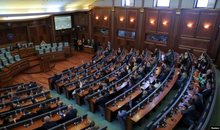
Kosovo/ The constitution of the Assembly fails for the 37th time
2025-06-25 15:24:28
Car catches fire in Tirana
2025-06-25 15:06:53
5 super healthy foods you should add to your diet
2025-06-25 14:57:48
TikTok returns to Albania, one-year ban quietly lifted after three months
2025-06-25 14:49:14


Gunfight at the Institute, 7 people involved, one of them arrested
2025-06-25 14:21:10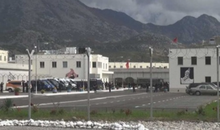
Convict dies in Lezha prison
2025-06-25 14:08:16

ACE Closes Filma24, the Movie Piracy Giant in Albania
2025-06-25 13:44:37

SPAK postpones the investigation against Ahmetaj for the fourth time
2025-06-25 13:12:42

Communication services in Albania cost more than the EU average
2025-06-25 12:55:50
How to choose the right perfume scent according to your personality
2025-06-25 12:44:36




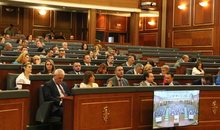
Today is the 37th attempt to constitute the Assembly.
2025-06-25 11:34:23
Accident in Tirana, taxi hits two children with a wheelchair
2025-06-25 11:19:05
Some reasons why gossip isn't as toxic as you think
2025-06-25 11:07:51

Selling dope in nightclubs, 33-year-old arrested in Tirana
2025-06-25 10:45:25
The Supreme Court rejects the appeal of Jamarbër Malltez
2025-06-25 10:26:58
The warned cyberattack on Tirana Municipality brings back security concerns
2025-06-25 10:19:43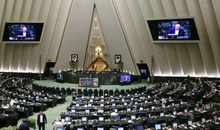
Iranian parliament votes to suspend cooperation with UN nuclear watchdog
2025-06-25 10:03:02
Bosnian fraudster arrested, wanted in Germany
2025-06-25 09:53:10
May 11/ Nuri: The vote 'died' before it was cast in the box
2025-06-25 09:42:02
Men with big bellies are at risk of suffering from this problem
2025-06-25 09:37:26

Today, around 28,000 9th grade students are taking the math exam.
2025-06-25 09:19:14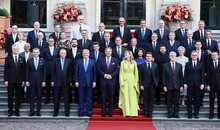
NATO arms itself against potential threats from Russia
2025-06-25 09:03:09
Tourists don't come, Albanians leave!
2025-06-25 08:59:08
TNT explosion in Vlora
2025-06-25 08:38:41
Tourism/ Kosovo "flees" after visa waiver, Poles and Spaniards "get upset"
2025-06-25 08:22:43
Horoscope, what do the stars have in store for you today?
2025-06-25 08:09:54
Ditë me diell, parashikimi i motit, si do të ndryshojnë temperaturat
2025-06-25 07:59:33
Morning Post/ In 2 lines: What mattered yesterday in Albania
2025-06-25 07:45:27



Earthquake tremors felt again in Tirana
2025-06-24 22:11:53


US intelligence: Attacks on Iran did not destroy nuclear plants
2025-06-24 21:30:31
Accident on the Fier-Cekan axis, 3 injured
2025-06-24 21:16:32



Cancer season, what is expected to happen for each zodiac sign
2025-06-24 20:15:54


After ceasefire, Iranian airspace partially reopens to international flights
2025-06-24 19:47:10
Oil prices fall after Israel-Iran ceasefire reached
2025-06-24 19:26:52


Will Iran participate in the 2026 World Cup being held in the USA?
2025-06-24 18:46:36
